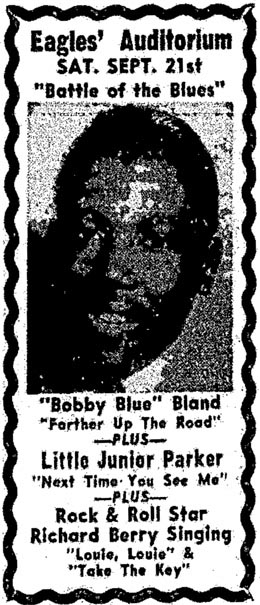On Saturday, September 21, 1957, a rhythm & blues revue that was touring its way up the West Coast made a Seattle stop at the Eagles Auditorium (7th Avenue and Union Street). Headlining the event that night -- which was promoted as a "Battle of the Blues" -- were a couple of famous hit-makers: Little Junior Parker and Bobby "Blue" Bland.
Louie's Local Debut
Both singers had worked the Pacific Northwest before -- performing on a circuit that included Olympia's fabled Evergreen Ballroom (9121 Pacific Avenue SE) and various National Guard armories across the state. But that 1957 dance featured an obscure opening act -- Richard Berry (1935-1997) -- who stepped onto the old stage and unleashed a rendition of his latest single, "Louie Louie."
This supremely simple song -- a cha-cha-beat driven three-chord ditty with lyrics about a lonely sailor confiding in his bartender, Louie -- made an indelible impression on area music fans and musicians alike. Initially released by Flip Records in April 1957, "Louie Louie" had shown just enough commercial promise to win Berry his slot on that tour, but it struggled to become a genuine hit. It did, however, find enough favor via jukebox play in the taverns surrounding Tacoma's military bases (which catered to an African American clientele) -- that the tune built up a sizable fan-base.
A Louie in Every Garage
In the wake of the Eagles hall show, local demand for the song soon manifested itself in requests made by audiences to young bands playing area dances. Seattle's leading teenage band, the Dave Lewis Combo, began playing "Louie Louie" at their weekly gigs at the Birdland dancehall (2203 E Madison Street) in 1957 and were quickly followed by others. By 1958 Tacoma's Blue Notes had adopted the tune, and in 1960 their cross-town rivals, the Wailers, recorded a version that became a No. 1 regional radio hit in early 1961. And again in 1962.
"Louie Louie" was well on its way to becoming the Northwest's signature song and reigning rock 'n' roll riff, and it was subsequently recorded by a good dozen Northwest teen garage bands (including the Kingsmen and Paul Revere and the Raiders who both enjoyed hit versions in 1963-1964). From there, the song's popularity grew exponentially. Countless combos across America (and then the world) took it on and "Louie Louie" -- which has been cut by about 1,600 different artists -- was ultimately recognized as the most highly recorded rock song ever.

